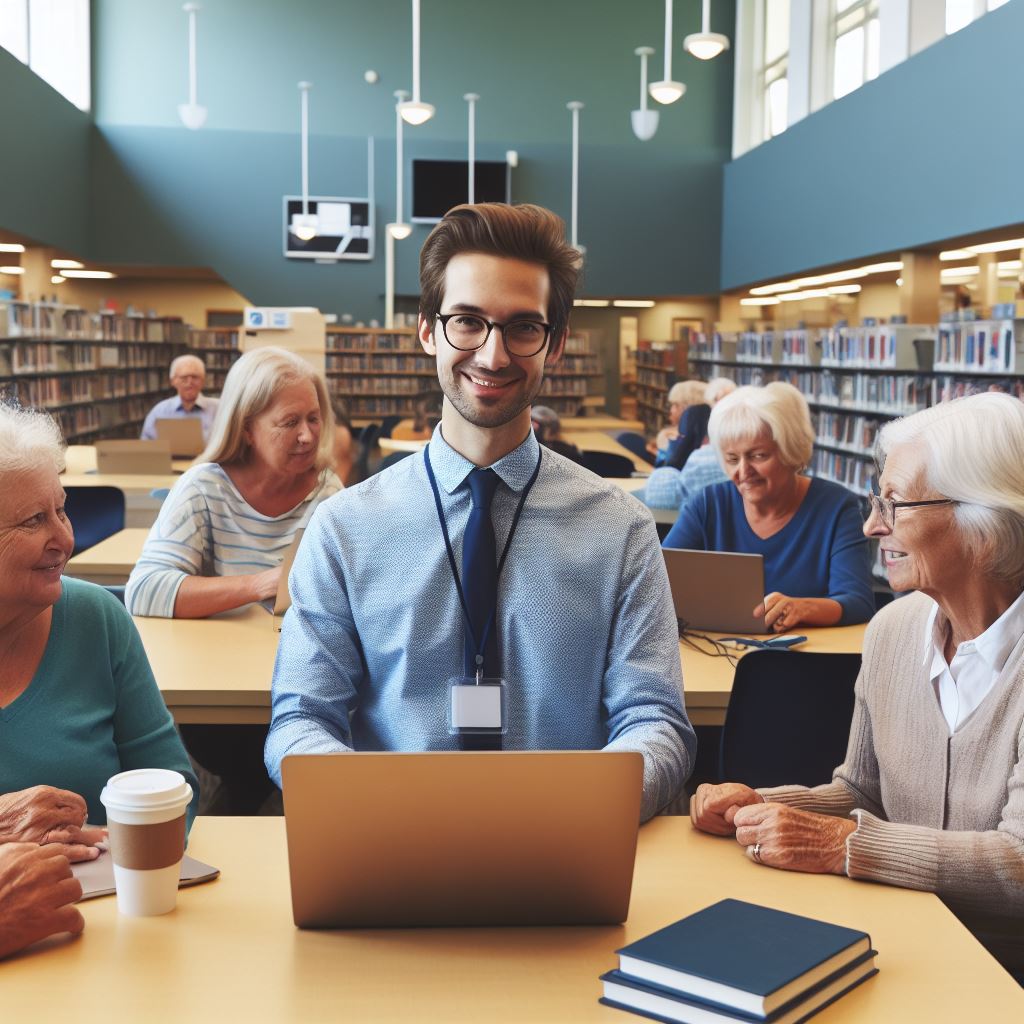Introduction
In this post, we’ll delve into how librarians play a vital role in shaping vibrant, connected communities in the United States through community development and outreach.
Community development isn’t just about erecting structures; it’s about fostering connections, empowering individuals, and enhancing the collective well-being of a locality.
Outreach, a dynamic component of this process, involves actively engaging with the community to understand its needs and aspirations.
Librarians partner with local leaders, championing the library as a crucial resource for community social and economic vitality.
In fact, the importance of librarians in community development and outreach cannot be overstated.
Their proactive roles extend beyond bookkeeping to community building, fostering connections that enrich the fabric of society.
This blog post aims to shine a spotlight on the impactful and dynamic contributions of librarians across the United States in creating thriving, interconnected communities.
The Evolving Role of Librarians
Traditional role of librarians as keepers of knowledge
In the ever-evolving landscape of community development and outreach, the role of librarians has seen a remarkable transformation.
Traditionally, librarians have been seen as keepers of knowledge. They have diligently organized, categorized, and preserved countless books and resources.
But their role has now expanded beyond the boundaries of the library.
The traditional role of librarians as keepers of knowledge cannot be overstated.
They have meticulously maintained vast collections of books, periodicals, and other educational materials.
Their expertise in organizing and cataloging information has made it easier for users to access the wealth of knowledge available at the library.
Shifting role of librarians towards community engagement and outreach activities
However, in recent years, there has been a shift in the role of librarians towards community engagement and outreach activities.
They are no longer confined to the four walls of the library; instead, they have become active participants in their communities.
Librarians now collaborate with various community organizations and local government agencies to develop programs and initiatives that address the needs of the community.
They actively participate in outreach activities aimed at promoting literacy, education, and lifelong learning.
By doing so, they have transformed themselves into catalysts for community development.
Librarians have recognized the importance of engaging with the community to foster its growth and development.
They go beyond providing access to information; they actively seek out opportunities to make a positive impact on their communities.
Transform Your Career Today
Unlock a personalized career strategy that drives real results. Get tailored advice and a roadmap designed just for you.
Start NowHow librarians have become catalysts for community development
- One-way librarians have become catalysts for community development is by offering programs and services that cater to the needs of different demographics.
- They provide resources and support for children, teens, adults, and seniors, ensuring that everyone has access to the knowledge and information they seek.
- Moreover, librarians have taken on the role of educators and facilitators.
- They organize workshops, seminars, and training sessions to empower individuals with essential skills such as digital literacy, critical thinking, and problem-solving.
- By doing so, they contribute significantly to the intellectual and social development of their communities.
- Librarians have also embraced technology and digital platforms to enhance community engagement.
- Utilizing social media, online platforms, and virtual resources, they extend reach, offering information and resources beyond the library’s physical confines.
- Furthermore, librarians actively collaborate with local businesses, schools, and community organizations to create partnerships that benefit the community as a whole.
- They serve as bridges, connecting different stakeholders and facilitating collaboration to address community challenges and promote growth.
In short, the role of librarians in community development and outreach has undergone a remarkable transformation.
Evolved from knowledge keepers, librarians actively drive community development, serving as catalysts for positive change.
Their evolving role in community engagement and outreach has significantly impacted the intellectual, social, and economic development of their communities.
Librarians continue to adapt to the evolving needs of their communities, ensuring that knowledge and information remain accessible to all.
Read: Ethical Guidelines Every US School Counselor Follows
Community Needs Assessment
The process of conducting a community needs assessment
Conducting a community needs assessment involves several steps:
- Identify the purpose and scope of the assessment.
- Gather relevant data and information about the community.
- Develop a survey or interview questions to collect feedback and opinions from community members.
- Administer the survey or conduct interviews with a representative sample of the community.
- Analyze the collected data to identify the needs, challenges, and gaps within the community.
- Compile and report the findings of the assessment to stakeholders and decision-makers.
Importance of librarians in identifying the needs of the community
Librarians play a crucial role in identifying the needs of the community due to their unique position as information professionals:
- Librarians have direct interaction with community members and can identify their information needs.
- They have access to various resources that provide insights into community demographics and trends.
- Librarians possess the skills to collect, evaluate, and analyze data to identify community needs accurately.
- They are trusted information experts who can gather feedback and opinions from community members effectively.
- Librarians can advocate for community needs and collaborate with other stakeholders to address them.
Examples of how librarians have successfully conducted community needs assessments
Librarians have proven to be effective in conducting community needs assessments, resulting in positive outcomes:
- In a rural community, a librarian organized focus groups and surveys to assess the community’s digital literacy needs.
- Based on the feedback, she developed programs to address those needs.
- In a multicultural neighborhood, a librarian conducted interviews to identify language barriers faced by immigrants.
- Consequently, the library offered language learning resources and translation services.
- In an underserved urban area, a librarian collaborated with local organizations to conduct a comprehensive assessment of social service needs.
- The findings prompted the creation of a community resource directory at the library.
- In a suburban town, a librarian used community feedback surveys to determine the demand for specific genres and topics.
- As a result, the library updated its collection to meet the community’s reading preferences.
Tailoring Library Services to Community Needs
How librarians modify library services based on community needs assessment results
Librarians play a crucial role in modifying library services based on the results of community needs assessment.
They understand that the library should cater to the specific requirements of the community it serves.
Various programs and initiatives implemented by librarians to address community needs
To address community needs, librarians implement various programs and initiatives that align with the interests and demands of their local community.
These initiatives are designed to make the library a hub for community outreach.
Examples of successful library services tailored to the specific requirements of the community
Successful library services are those tailored to the specific requirements of the community.
Here are a few examples:
- Close Collaboration with Schools and Educational Institutions: Librarians value school partnerships for literacy promotion and student resource access.
They develop programs that support the school curriculum and provide study spaces for students. - Technology Training and Access: Librarians understand the digital divide and the need for technological literacy.
They conduct training sessions, granting community-wide access to computers and the internet, ensuring technology benefits everyone. - Language and Cultural Programs: Acknowledging community diversity, librarians arrange cultural programs to celebrate and educate about various languages and cultures.
These programs foster understanding and promote inclusivity. - Job Seeker Assistance: Libraries provide job seeker resources, including resume workshops, interview prep, and job database access.
This helps individuals in their career development and contributes to the overall community’s economic growth. - Early Literacy Programs: Librarians understand the importance of early literacy in a child’s development.
They offer Storytimes, playgroups, and workshops that focus on fostering a love for reading and preparing children for school.
Librarians continuously assess the needs of their community by engaging in conversations with community members, conducting surveys, and seeking feedback.
This ongoing assessment helps them identify new programs or services that would benefit the community.
By tailoring library services to the specific needs of the community, librarians contribute to the development and outreach efforts in their respective communities.
Their dedication to understanding and addressing community needs is essential in cultivating a thriving and inclusive community.
Read: Technology’s Role in Modern School Counseling Practices

Collaboration with other Community Organizations
Importance of Collaboration for Effective Community Development and Outreach
In order to achieve effective community development and outreach, collaboration with other organizations is crucial.
Transform Your Career Today
Unlock a personalized career strategy that drives real results. Get tailored advice and a roadmap designed just for you.
Start NowCollaboration allows librarians to pool resources, expertise, and networks to address community needs more comprehensively.
By working together, organizations can leverage each other’s strengths and create sustainable solutions that have a greater impact.
How Librarians Collaborate with other Community Organizations to Achieve Common Goals
Librarians engage in various collaborative efforts with community organizations to achieve common goals of community development and outreach.
They actively participate in interagency committees and task forces to discuss and plan initiatives that benefit the community.
Librarians also establish partnerships with organizations such as nonprofit agencies, schools, and local government entities.
Through these partnerships, librarians can coordinate efforts, share resources, and align services to meet the diverse needs of the community.
For example, a librarian may collaborate with a local nonprofit organization to organize literacy programs for underprivileged children.
By combining their expertise, the librarian and the nonprofit can create a comprehensive program that addresses education gaps in the community.
Examples of Successful Collaborations between Librarians and Community Organizations
Numerous successful collaborations between librarians and community organizations have resulted in impactful community development and outreach.
- One example is the collaboration between a public library and a local healthcare provider to promote health literacy.
- The librarian and healthcare professionals worked together to develop informational materials and organize workshops on various health topics.
- Through this collaboration, the community gained access to valuable health resources and knowledge, ultimately improving their well-being.
- Another example is the partnership between a library and a senior center to address social isolation among elderly community members.
- The librarian and the senior center staff organized social events, book clubs, and technology classes specifically tailored to seniors’ interests.
- As a result, the collaboration increased social connections and provided opportunities for lifelong learning and engagement for seniors.
- These successful collaborations demonstrate the positive impact that can be achieved when librarians join forces with other community organizations.
In essence, collaboration plays a vital role in effective community development and outreach.
Librarians collaborate with other community organizations to achieve common goals and address the diverse needs of their communities.
Through collaboration, librarians are able to pool resources, expertise, and networks, resulting in more impactful and sustainable solutions.
Successful collaborations between librarians and community organizations have proven to improve literacy, health, and social connections in communities.
Therefore, fostering and nurturing collaborations should be a priority for librarians as they continue to serve their communities.
Read: Anatomy of a Day: A Glimpse Into a US Librarian’s Routine
Promoting Literacy and Lifelong Learning
The role of librarians in promoting literacy and education within the community
Librarians stand as literacy advocates, orchestrating programs that transcend mere book lending. They actively engage with communities to foster a love for reading.
Innovative literacy initiatives, from story hours for children to adult reading clubs, showcase librarians’ dedication to making reading accessible to all.
Librarians don’t merely stock shelves; they curate diverse collections, ensuring literature mirrors the richness of the community it serves.
Through partnerships with schools, librarians promote literacy as a collaborative effort, extending the love for reading beyond library walls.
The impact of libraries on supporting lifelong learning
Libraries aren’t static repositories; they’re dynamic spaces fostering lifelong learning. Beyond books, they offer an array of resources, from online courses to workshops.
Transform Your Career Today
Unlock a personalized career strategy that drives real results. Get tailored advice and a roadmap designed just for you.
Start NowTechnology plays a pivotal role, with libraries providing computer access and digital resources, bridging the digital divide for those seeking to enhance their skills.
Workshops on topics like financial literacy and coding showcase libraries as hubs for acquiring practical, real-world knowledge.
Libraries adapt to societal shifts, embracing new mediums like e-books and audiobooks, ensuring they remain relevant in the ever-evolving landscape of lifelong learning.
Examples of library programs that promote literacy and lifelong learning
Here are some examples of library programs that effectively promote literacy and lifelong learning:
- The Summer Reading Program: Libraries organize engaging reading activities during the summer to encourage children and adults alike to read.
- Storytime Sessions: Librarians conduct interactive story time sessions for young children, fostering a love for books and reading.
- Book Clubs: Libraries host book clubs where members can discuss literature, exchange ideas, and develop critical thinking skills.
- Adult Education Classes: Librarians organize classes on various subjects, such as language learning, computer skills, and financial literacy, to empower adults.
- Technology Training: Librarians provide training on digital skills, including internet usage, online research, and using software programs.
- Reading Challenges: Libraries organize reading challenges, encouraging participants to set reading goals and track their progress.
- Author Visits: Libraries invite authors for talks and signings, promoting a deeper appreciation for literature and the writing process.
- Community Workshops: Libraries host workshops on topics like writing, storytelling, and journalism to cultivate creativity and communication skills.
- Mobile Libraries: Librarians bring books and educational resources to underserved communities, promoting access to information and learning.
- Family Literacy Programs: Libraries offer programs that involve both parents and children, promoting family bonding through reading and learning together.
Librarians drive community engagement and cultivate a love for learning through innovative initiatives.
Libraries, shaped by their dedication, transform into dynamic education hubs, impacting literacy and lifelong learning profoundly.
As catalysts for intellectual growth, librarians play a pivotal role in shaping their communities’ educational landscape.
Beyond books, libraries, through diverse initiatives, spark a passion for knowledge and personal development.
These endeavors directly influence community educational attainment and overall growth.
Adapting to evolving needs, librarians collaborate for meaningful learning experiences, contributing to an enlightened society.
Overcoming Challenges and Future Outlook
Challenges faced by librarians in community development and outreach
- Limited funding and resources to support community programs and initiatives.
- Lack of awareness and recognition of the librarian’s role in community development.
- Resistance from community members who may not see the library as a valuable resource.
- Bureaucratic obstacles in implementing new programs and services.
- Adapting to changing technologies and digital resources.
- Overcoming stereotypes and misconceptions about librarians and libraries.
Strategies employed by librarians to overcome these challenges
- Collaborating with community organizations and seeking partnerships for funding and support.
- Engaging in proactive marketing and outreach efforts to raise awareness of the library’s role.
- Offering innovative and relevant programs that appeal to diverse community needs and interests.
- Advocating for policy changes and removing bureaucratic obstacles to enhance community development.
- Investing in professional development to stay updated with emerging technologies and digital resources.
- Challenging stereotypes through community engagement and showcasing the library’s value.
Insights into the future outlook of the role of librarians in US community development and outreach
- The role of librarians in community development and outreach will continue to evolve and expand.
- They will not only be information providers but also actively contribute to social change and development.
- Librarians will play a vital role in addressing community needs, fostering inclusivity, and promoting lifelong learning.
- With advancements in technology, librarians will harness digital resources and online platforms to reach a wider audience.
- Libraries will become dynamic community centers that offer a variety of services beyond traditional book lending.
- The future outlook of librarians in community development and outreach is promising as they adapt to changing needs and serve as catalysts for positive change.
Read: The Significance of Diversity in US Libraries and Staffing
Conclusion
In this blog post, we have explored the key points regarding the role of librarians in community development and outreach.
Librarians play a crucial role in community development by serving as information experts, facilitators of learning, and promoters of literacy.
They create inclusive spaces, provide access to valuable resources, and organize programs that cater to the diverse needs of the community.
Librarians engage with communities, build partnerships, and collaborate to address challenges and promote social connections effectively.
Through their dedication and commitment, librarians contribute to the betterment of society and foster a sense of belongingness among community members.
It is important to acknowledge and reinforce the significance of librarians in community development and outreach.
By supporting libraries and the role of librarians, individuals can contribute to the overall growth and progress of their communities.
Readers are encouraged to actively participate in library programs, utilize library resources, and spread awareness about the pivotal role of librarians.
In doing so, they can help create stronger, more connected, and thriving communities.
Transform Your Career Today
Unlock a personalized career strategy that drives real results. Get tailored advice and a roadmap designed just for you.
Start NowSupport your local library and join hands with librarians in making a positive impact on community development and outreach.
Together, let us celebrate and champion the invaluable role of librarians in shaping vibrant and inclusive communities.




